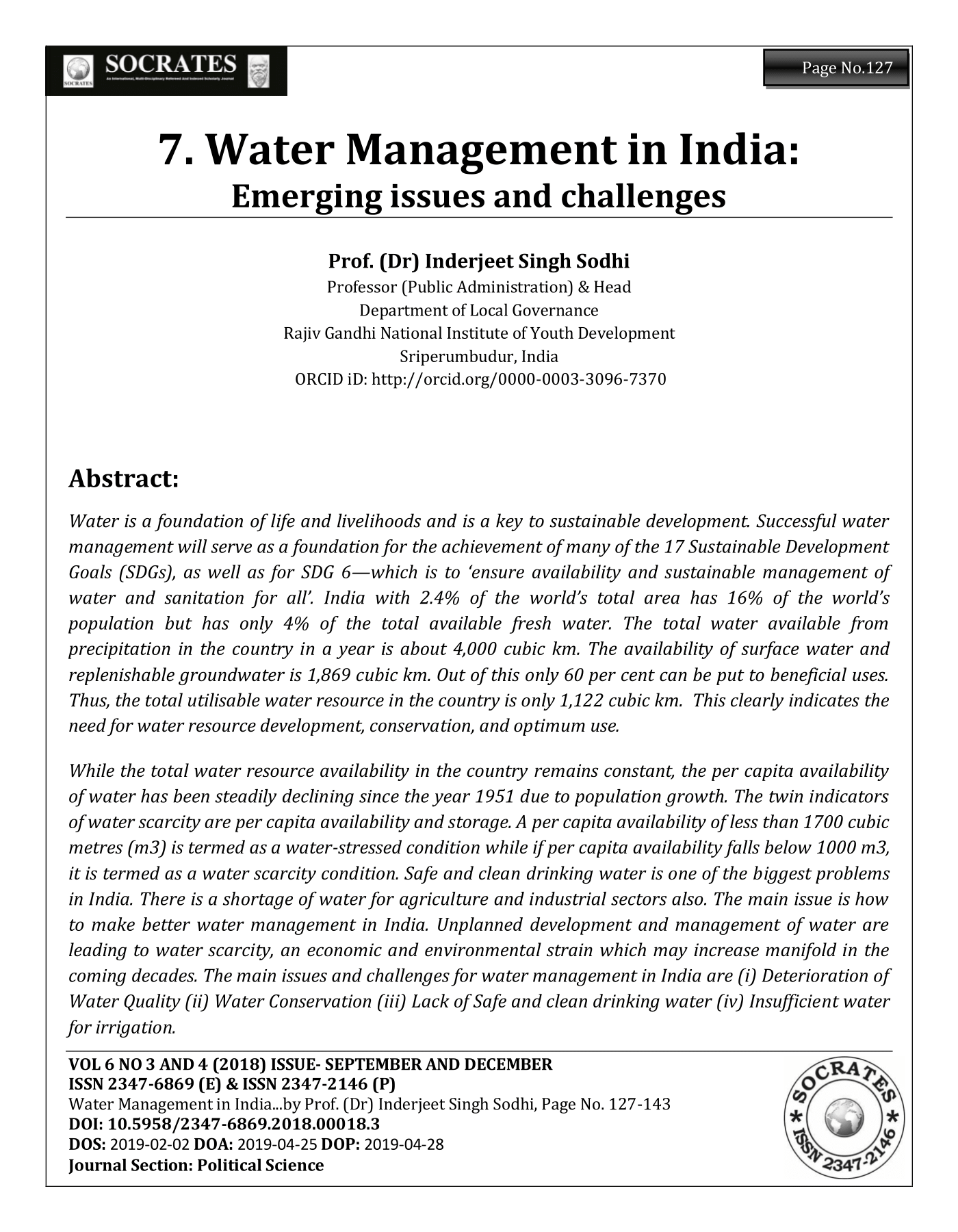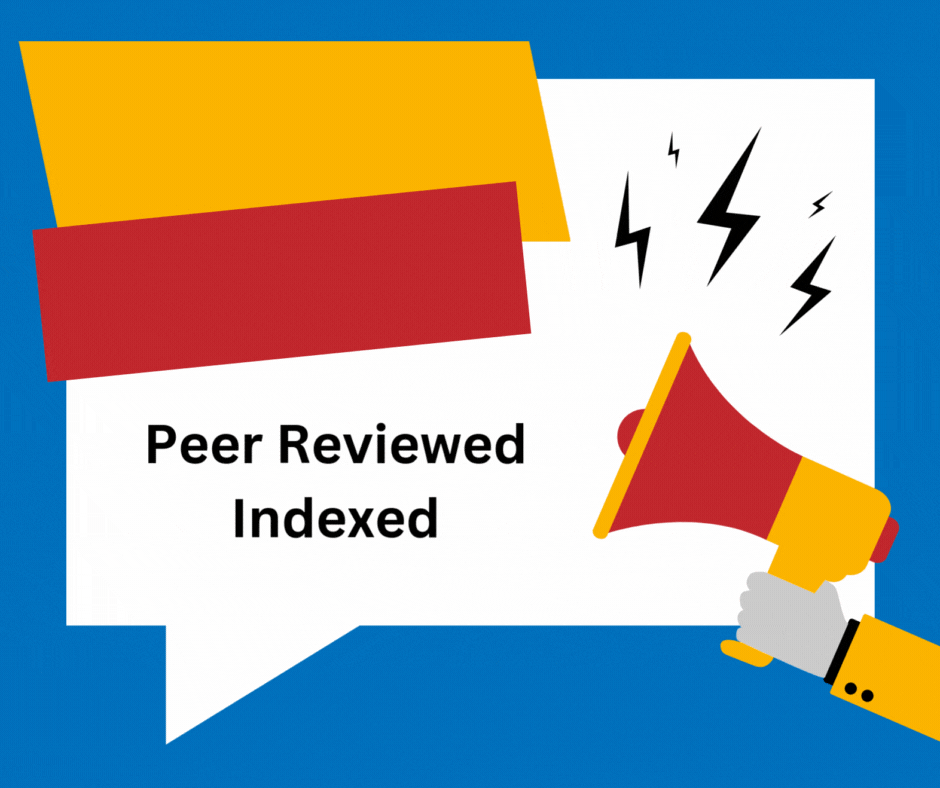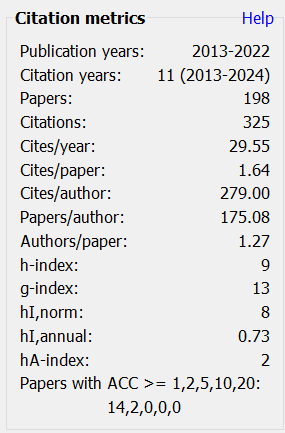Water Management in India
Emerging issues and challenges
DOI:
https://doi.org/10.5958/2347-6869.2018.00018.3Keywords:
Water, Water Management, India, Ministry of Water Resources, Issues, ChallengesAbstract
Water is a foundation of life and livelihoods and is a key to sustainable development. Successful water management will serve as a foundation for the achievement of many of the 17 Sustainable Development Goals (SDGs), as well as for SDG 6—which is to ‘ensure availability and sustainable management of water and sanitation for all’. India with 2.4% of the world’s total area has 16% of the world’s population but has only 4% of the total available fresh water. The total water available from precipitation in the country in a year is about 4,000 cubic km. The availability of surface water and replenishable groundwater is 1,869 cubic km. Out of this only 60 per cent can be put to beneficial uses. Thus, the total utilisable water resource in the country is only 1,122 cubic km. This clearly indicates the need for water resource development, conservation, and optimum use.
While the total water resource availability in the country remains constant, the per capita availability of water has been steadily declining since the year 1951 due to population growth. The twin indicators of water scarcity are per capita availability and storage. A per capita availability of less than 1700 cubic metres (m3) is termed as a water-stressed condition while if per capita availability falls below 1000 m3, it is termed as a water scarcity condition. Safe and clean drinking water is one of the biggest problems in India. There is a shortage of water for agriculture and industrial sectors also. The main issue is how to make better water management in India. Unplanned development and management of water are leading to water scarcity, an economic and environmental strain which may increase manifold in the coming decades. The main issues and challenges for water management in India are (i) Deterioration of Water Quality (ii) Water Conservation (iii) Lack of Safe and clean drinking water (iv) Insufficient water for irrigation.
The Ministry of Water Resource, River Development & Ganga Rejuvenation has been allocated the subject of regulation and development of inter-State rivers, implementation of awards of Tribunals, water quality assessment, bilateral and external assistance and co-operation programmes in the field of water resources and matters relating to rivers. In the 21st century India, there is a declining availability of fresh water and increasing demand, the need has arisen to conserve and effectively manage this precious life-giving a resource for sustainable development. There is need to take quick steps and make effective policies and laws (no doubt, there is water policy 2002, but that is not dealing effectively with these issues), and adopt effective measures for its conservation. There is a need to encourage watershed development, rainwater harvesting, water recycling and reuse, and conjunctive use of water for sustainable water supply in the long run.
DOI: 10.5958/2347-6869.2018.00018.3
Downloads
Metrics
References
High-Level Experts Forum: Expert papers. (2009). Retrieved from http://www.fao.org/wsfs/forum2050/wsfs-background-documents/wsfs-expert-papers/en/
Centre for Research on the Epidemiology of Disasters (CRED). (2016). 2016 preliminary data: Human impact of natural disasters. Brussels, Belgium. Retrieved from http://cred.be/sites/default/files/CredCrunch45.pdf
Government of India Ministry of Water Resources, River Development and Ganga Rejuvenation, New Delhi. (2015). Annual Report 2015-16. Retrieved from http://mowr.gov.in/sites/default/files/AR2015-16_2.pdf
Government of India Ministry of Water Resources, River Development and Ganga Rejuvenation, New Delhi. (2017). Annual Report 2017-18. Retrieved from http://mowr.gov.in/sites/default/files/Annual_Report_MoWR_2017-18.pdf
Government of India. (2012). Final Report of Major Irrigation and Watershed Management for the Twelfth Five Year Plan (2012-17). Planning Commission. New Delhi
Guppy, L., Anderson, K., (2017). Water Crisis Report. United Nations University Institute for Water, Environment and Health, Hamilton, Canada.
OECD (2001), OECD Environmental Outlook, OECD Publishing, Paris, https://doi.org/10.1787/9789264188563-en.
OECD (2012), OECD Environmental Outlook to 2050: The Consequences of Inaction, OECD Publishing, Paris, https://doi.org/10.1787/9789264122246-en.

Downloads
Published
How to Cite
Issue
Section
Categories
License
Copyright (c) 2019 Prof. (Dr) Inderjeet Singh Sodhi

This work is licensed under a Creative Commons Attribution-NonCommercial 4.0 International License.
Revised Copyright/CC license that applies to all the articles published after 05-02-2017
Attribution-NonCommercial 4.0 International (CC BY-NC 4.0)

Copyright/CC license that applies to all the articles published before 05-02-2017
Attribution-Non Commercial-No Derivatives 4.0 International (CC BY-NC-ND 4.0)

Author(s) will retain all the right except commercial and re-publishing rights. In the case of re-publishing, they will have to obtain written permission from the journal. Additional licensing agreements (Creative Commons licenses) grants rights to readers to copy, distribute, display and perform the work as long as you give the original author(s) credit, they can not use the works for commercial purposes and are not allowed to alter, transform, or build upon the work. For any reuse or distribution, readers and users must make clear to others the license terms of this work. Any of these conditions can be waived if you get permission from the copyright holders. Nothing in this license impairs or restricts the authors’ rights. To view a copy of this license, visit http://creativecommons.org/licenses/by-nc-nd/4.0/ or send a letter to Creative Commons, 171 Second Street, Suite 300, San Francisco, California, 94105, USA.
Research Papers published in SOCRATES are licensed under an Attribution-NonCommercial-NoDerivatives 4.0 International (CC BY-NC-ND 4.0)
















